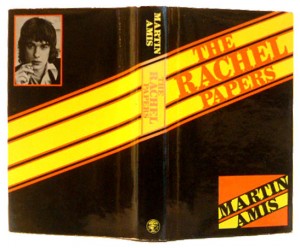You have no items in your cart. Want to get some nice things?
Go shopping Charles Highway, the protagonist of Martin Amis’ first novel, The Rachel Papers, is not the most likeable character. He is self-aware, self-involved and self-important; his “papers” detail meticulous plans to win the affections of Rachel and get into Oxford University, all the while constantly reflecting on “how fucking clever” he is.
Charles Highway, the protagonist of Martin Amis’ first novel, The Rachel Papers, is not the most likeable character. He is self-aware, self-involved and self-important; his “papers” detail meticulous plans to win the affections of Rachel and get into Oxford University, all the while constantly reflecting on “how fucking clever” he is.
But despite his obvious narcissistic downfalls, I found myself frequently sympathising with Charles. The Rachel Papers is all a bit meta; our narrator structures his life around the literary greats (“I know what it’s supposed to be like, I’ve read my Lawrence”) and struggles to articulate genuine feelings when things stray out of this romanticised framework. From arranging his books to casually exude intellectualism, or reciting T. S. Eliot to delay orgasm, no action is devoid of cultural significance.
The Rachel Papers is—partially, at least—about being a writer and buying into the pervasive myth that true creativity belongs to troubled geniuses. The subsequent pressure to make life worthy of documentation causes Charles to long for something heart-wrenching to occur:
The thing is that I am a member of that sad, ever-dwindling minority… the child of an unbroken home. I have carried this albatross since the age of eleven, when I started grammar school. Not a day would pass without somebody I knew turning out to be adopted or illegitimate […] How I envied their excuses for introspection, their ear-marked receptacles for every just antagonism and noble loyalty.
But by insisting on viewing ordinariness as an encumbrance and grading every encounter in terms of storytelling value, Charles becomes hard to decipher. He treats his relationship with Rachel as a kind of social experiment in what love entails: berating her for letting her façade of femininity slip in a “Celia shits” incident; having sex with another girl minutes before she arrives and reusing the condom; treating intimacy as a list of moves to be ticked off (“I completed a really very complicated set of manoeuvres. It featured, among other things, the worrying of her hip-bone with my elbow, stroking her eyelashes, and kissing her ears”). Charles wants Rachel to be exceptional—the subject of a Shakespearean sonnet, the Juliet to his Romeo—but, unsurprisingly, she can’t live up to the heights of his expectation.
But despite Charles’ emotions being constantly “catalogued and filed away” for analysis, moments of unscripted vulnerability do occur, even though you get the impression that Charles is oblivious to this reality. He grows to like Rachel for who she is rather than the idea of her (“Goodness me, I really did like her”) and seems genuinely upset by his father’s infidelity. Perhaps most poignant is when he shares a moment with his sister, commenting: “We had both wanted to talk, I think; I don’t know why we didn’t.” This almost-there type of authenticity recurs throughout the novel. Charles nearly says something important, but opts to say what he thinks he should instead. But that’s kind of the point: The Rachel Papers is a portrait of someone young, selfish and absorbed by the idea of cultural brilliance, which completely informs the way the story is told.
For all its unappealing characters and overwrought encounters, The Rachel Papers is told in a hilarious and astutely observed manner; I particularly enjoyed the description of Rachel doing a “Walt Disney shiver”. It’s perhaps not the literary masterpiece Charles—and even Amis—is striving for, but it’s a brilliant debut novel that, for all its hopelessly contemplative reflections, is strangely touching.
The Rachel Papers is Martin Amis’ debut novel, first published in 1973 by Jonathan Cape.
About Catherine Noonan
Among other things, Catherine likes to write, mostly about cultural topics such as literature, theatre, film and TV.




